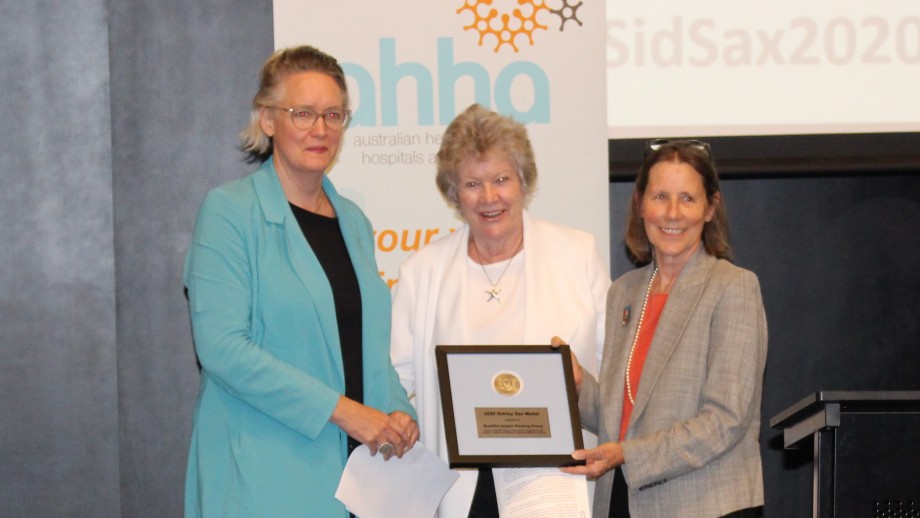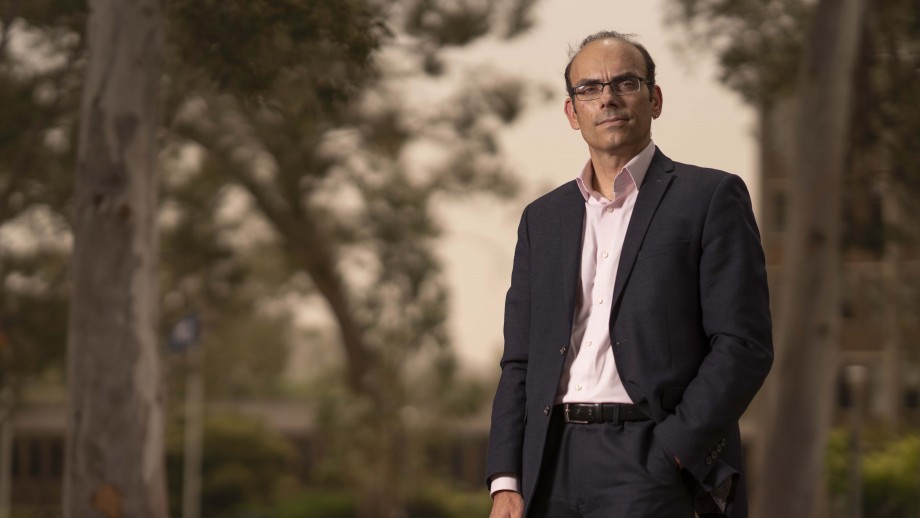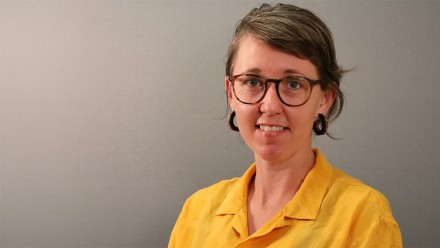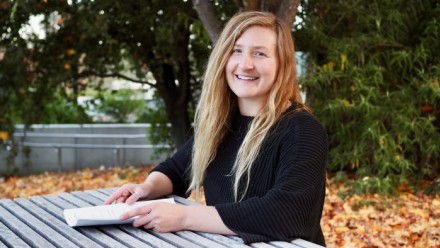2020 Public Policy Climate Highlights
We regularly conducted private briefings for parliamentarians and government departments on a wide range of climate related topics in. Our members also had numerous state, national and international advisory roles.
Here are some examples of policy engagement and outreach by Climate Change Institute members.
Bushfire Impact Working Group honoured

The ANU Bushfire Impact Working Group has been jointly awarded the prestigious Sidney Sax Medal for outstanding contribution to Australian healthcare, with Patricia Turner, CEO of the National Aboriginal Community Controlled Health Organisation.
Prof Sotiris Vardoulakis and collaborators recognized for public health advocacy & leadership during the 2019/20 ‘Black Summer’

Prof Sotiris Vardoulakis and his team have been presented with the Advocacy & Leadership Award at the virtual Australian Public Health Conference 2020.
“This is a great recognition of our work on public health communication during the terrible bushfires and in the aftermaths of the crisis. Many colleagues from across RSPH and ANU contributed tirelessly to this effort, and I am proud of our work to help protect public health and support affected communities,” says Vardoulakis.
Senate Finance and Public Administration References Committee – Inquiry into lessons learned in relation to the Australian bushfire season 2019-20
On 5 February 2020, the Australian Senate launched an inquiry into lessons to be learned in relation to the devastating 2019-20 Australian bushfire season.
The Australian National University (ANU) made a submission to the Inquiry addressing four out of the nine terms of reference. This submission was coordinated by the ANU Climate Change Institute (CCI) and included authored contributions from ANU scholars across disciplines and Colleges, including from the College of Law, the College of Health and Medicine, the Public Policy and Societal Impact Hub and the Australian Centre for the Public Awareness of Science. You can find a copy of the submission here.
Following this submission, four CCI members – Dr Arnagretta Hunter, Prof David Lindenmayer, Prof Mark Howden, and Prof Sotiris Vardoulakis – were invited to brief the Committee on various topics, including the impacts of bushfire smoke upon people’s respiratory health.
Royal Commission into National Natural Disaster Arrangements

On 20 February, the Royal Commission into National Natural Disaster Arrangements was established. The Commission was established following the devastating 2019-20 bushfire season in Australia, to examine the national disaster management preparedness, coordination, and response.
The ANU made a submission to the Commission addressing three of the twelve terms of reference. The submission was coordinated by the ANU Climate Change Institute and includes authored contributions from ANU scholars across disciplines and Colleges, including from the Fenner School of Environment and Society, the College of Law and the College of Health and Medicine. You can find a copy of the submission here.
Following the submission, Prof Mark Howden was invited to give an informal presentation to the Commission.
Technology Investment Roadmap: First Low Emissions Technology Statement 2020

On 21 May 2020, consultation opened for the Australian Government’s national Technology Investment Roadmap. The aim of the Roadmap is to drive investment in low emissions technologies, to support Australian jobs and businesses, and strengthen the economy following the impacts of the COVID-19 pandemic.
CCI and the Energy Change Institute (ECI) jointly organised and presented an open public forum on 12 June, aimed at sharing a range of perspectives around the Roadmap’s discussion paper. The event featured an expert panel comprising academics from across ANU, as well as speakers from a range of other institutions. Senior officials from the Department of Industry, Science, Energy and Resources (DISER) from the team that led development of the Technology Investment Roadmap discussion paper also joined us. You can watch the recording of the event here.
CCI then made a submission to the Roadmap Discussion Paper, featuring contributions by five CCI members. You can read the policy submission here.
Following the release of the Technology Investment Roadmap on 22 September, ECI and CCI collaborated on a mini event series to analyse the Roadmap. ECI held an event titled Digging deeper into the Technology Investment Roadmap, which explored the Roadmap in detail. You can view the ECI event recording here. CCI then held an event titled Carbon Capture and Use as an emerging technology, which discussed how CCU technologies are being developed and adopted in Europe and Australia, and what benefits CCU could bring to Australia. You can watch the CCI event recording here.
Climate Change (National Framework for Adaptation and Mitigation) Bill 2020
On 9 November, MP Zali Steggall introduced the Climate Change (National Framework for Adaptation and Mitigation) Bill 2020 to the House of Representatives.
The House then referred the Bill to the House Standing Committee on the Environment and Energy for inquiry and report. ANU made a submission, coordinated by CCI, to the Inquiry. You can read a copy of the submission here.
Policy engagement in the Pacific

In February, Dr Christian Downie and Research Associate Kirsty Anantharajah presented at the Climate Finance and Regulation Roundtable at the Reserve Bank of Fiji in Suva. They also gave a presentation for Policy and Regulation training at the Fiji Department of Energy in Suva.
Global Alliance of Universities on Climate
The Global Alliance of Universities on Climate (GAUC), of which ANU became a member in 2019, held an online public event in September titled Pathways to Net Zero Emissions.
CCI member Prof Justin Borevitz gave a presentation at the event, titled Land Based Carbon Drawdown for Food, Ecosystem and Climate Security’ for the event on ‘Pathways to Net Zero Emissions.
ANU Contributions to the Intergovernmental Panel on Climate Change
The IPCC is tasked with providing policymakers with regular scientific assessments on climate change, its implications and potential future risks, as well as putting forward adaptation and mitigation options. It has 195 member countries.
In 2020, a number of CCI members have been heavily involved in the work of the IPCC in several capacities. In new appointments, Prof Frank Jotzo and Prof Mark Howden were selected as a member of the core writing team and the Review Editor respectively for the upcoming IPCC Synthesis Report for the Sixth Assessment Report. You can read more about these appointments, and the Synthesis Report, here.
Prof Frank Jotzo is also continuing his position as a Lead Author on Working Group III – Mitigation of Climate Change.
Prof Mark Howden also continues in his position as a Vice Chair for Working Group II – Impacts, Adaptation and Vulnerability.
Other CCI members who hold continuing positions in the IPCC are – Dr Joelle Gergis as a Lead Author on Working Group I – The Physical Science Basis; Assoc. Prof Kathryn Bowen as a Lead Author on Working Group II; Dr Ruth Morgan, also as a Lead Author on Working Group II; Dr Steven Crimp as a member of the Task Group on Data Support for Climate Change Assessment; and Distinguished Prof Xuemei Bai as a Lead Author on Working Group III.
Prof Nerilie Abram also wrapped up her role this year as a Coordinating Lead Author for the IPCC Special Report on the Ocean and Frozen Regions in a Changing Climate.
COVID-19 and Climate Change
2020 saw the COVID-19 pandemic emerge as a global crisis requiring immediate, wide-spread and evidence-based action.
As countries took drastic measures to curb the spread of the virus, comparisons arose between the global response to COVID-19 and climate change.
Below are some of the activities by the Institute and our members that look at the intersections between the COVID-19 pandemic and climate change.
COVID-19 and Climate webinar series
From June to August, we ran a series of five online events focussing on five different topics where comparisons can be drawn between the COVID-19 pandemic’s impacts and climate change.
- Parallels and disconnects;
- Policy responses;
- Communications;
- Health implications, and;
- Pacific impacts and climate negotiations.
The event series highlighted several areas where we can draw lessons from the global response to the COVID-19 pandemic to improve action on climate change, through acting promptly and collaboratively in accordance with scientific and expert advice.

You can watch the recordings of these events on the ANU Climate Change Institute YouTube channel.
ACIAR report – COVID-19 and food systems in the Indo-Pacific: An assessment of vulnerabilities, impacts and opportunities for action

On 10 November, the Australian Centre for International Agricultural Research (ACIAR) released a report titled COVID-19 and food systems in the Indo-Pacific: An assessment of vulnerabilities, impacts, and opportunities for action.
The report co-leaders included CCI members Dr Lisa Robins and Dr Steven Crimp. Several other CCI members also contributed to the authorship, including Dr Robyn Alders, Dr R. Michael Bourke, Dr Aparna Lal, and Dr John McCarthy.
The report found that in the Indo-Pacific, COVID-19 has intersected a number of underlying hazards already threatening food security. Most significant of these is climate change and associated increases in extreme events. These increases in extremes have challenged agricultural productivity and increased food disruptions and exposure to extended periods of food insecurity.
The pandemic has intersected with climate change and other hazards to exacerbate vulnerabilities and risks. Among the most vulnerable are the urban poor, women, youth, and smallholder farmers, all of whom face disproportionate disadvantage due to the complex interaction of class, status, and socio-economic conditions.
You can read the full report here on the ACIAR website.
National and International advisory roles
Professor Mark Howden, CCI Director, has provided high-level input to the following advisory panels and forums:
- ACT Climate Change Council
- Global Alliance of Universities on Climate Change Academic Board Member
- Qld Government Drought and Climate Adaptation Program Advisory Group
- Meat & Livestock Australia Green House Gas and Livestock Technical Advisory Group
- ANU Menzies Centre for Health Governance
- CO2 Value Australia Director
- International Science Advisory Committee of the Chilean Centre for Climate Science and Resilience
- Editorial Board of the journal Climate Risk Management
Departmental briefings
The CCI has conducted briefings on climate change for the following organisations:
- Minister for Environment, The Hon. Sussan Ley
- Senator for Queensland Gerrard Rennick
- Department of Agriculture, Water and the Environment – multiple briefings
- Department of Foreign Affairs and Trade (DFAT) – multiple briefings - and Ambassador for the Environment
- Department of Industry, Science, Energy and Resources
- Federal Treasury
- Climate Change Authority
- ACT Government
Parliamentary briefings
- 3 Federal parliamentary briefing sessions
- 1 Territory parliamentary briefing
Diplomatic engagement
The CCI has conducted several briefings with High Commissions and Embassies in Australia, including UK, Italy, France, Denmark, and Costa Rica.
Other briefings
The CCI Director has also briefed a range of industry bodies, NGOs and community groups including:
Agriculture
Keynote speaker at the ACT Government’s Resilient Farming in a Changing Climate forum. In November.
Other
Attended the World Economic Forum Annual Meeting in Davos-Klosters, Switzerland
Policy Engagement by research theme
CCI members engage with policymakers on climate at an international, national and state / territory level on an ongoing basis. Here are a few examples (far from comprehensive):
Climate change adaptation
Dr Tayanah O’Donnell was part of the project team for the publication Local Government Climate Change Adaptation Roles and Responsibilities under Victorian legislation: Guidance for local government decision makers. The guidance brief delivers on a commitment under Victoria’s Climate Adaptation Plan 2017-2020 to assist local government decision-makers to understand the scope and deliver on their roles and responsibilities for adaptation under current Victorian legislation. You can find a copy of the publication here.
Climate change mitigation
Numerous CCI members were involved in the authorship and editing of the Academy of the Social Sciences in Australia publication Efficient, Effective and Fair Climate Policy: a Discussion Paper. Prof Sharon Friel, Prof Quentin Grafton, casual research assistant Caitlyn Baljak, Prof Frank Jotzo, Dr Ken Henry, and Prof Mark Howden were all involved in the paper in varying capacities. The paper discusses mechanisms to support the least costly, and environmentally effective, climate change mitigation in Australia and globally. You can find a copy of the paper here.
Climate change and bushfires
Assoc. Prof Geoff Cary was appointed as a member of the Minister for Industry, Science and Technology’s Bushfire Science Roundtable.
International climate change negotiations
PhD Scholar Melanie Pill ran a workshop on climate change loss and damages for stakeholders from the Government of Vanuatu, in order to help them develop a section on loss and damages for their Nationally Determined Contribution (NDC) under the Paris Climate Agreement. The workshop was part of a larger consultancy that also developed targets and indicators for adaptation in the NDC as well as enhanced action on adaptation.











